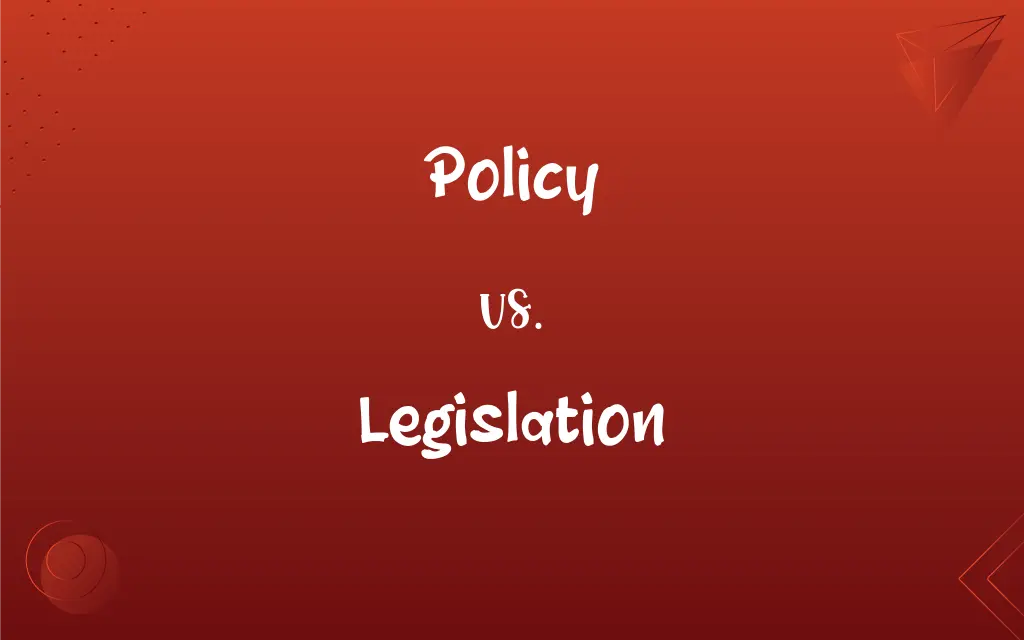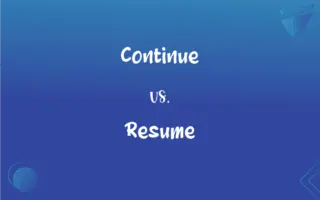Policy vs. Legislation: What's the Difference?
Edited by Aimie Carlson || By Janet White || Published on January 16, 2024
Policy is a course or principle of action adopted by an organization or individual. Legislation are laws enacted by a government or legislative body.

Key Differences
Policy refers to a set of guidelines or principles set by organizations, businesses, or governments to guide decisions and actions. Legislation is the process of making or enacting laws, typically carried out by a government's legislative body.
Policies can be internal rules of an organization, not necessarily enforceable by law. Legislation, in contrast, is legally binding and enforceable in a court of law.
Policies can encompass a wide range of areas, including company protocols, government strategies, or individual guidelines. Legislation specifically refers to statutes, acts, and legal regulations passed by a legislative authority.
Policy making often involves planning and decision-making processes within organizations. Legislation requires formal procedures like bill proposals, debates, amendments, and approvals by legislative bodies.
Policies can be quickly changed or adapted by the organization that set them. Legislation typically involves a more complex and lengthy process for amendments or repeals.
ADVERTISEMENT
Comparison Chart
Nature
Guidelines or principles
Legal laws enacted by a government
Enforceability
Not legally enforceable unless codified into law
Legally binding and enforceable in court
Scope
Can be set by organizations, governments, or individuals
Enacted by governmental legislative bodies
Process
Involves decision-making and planning within organizations
Involves formal legislative procedures
Flexibility
Can be changed or adapted more easily
Requires formal amendment or repeal processes
ADVERTISEMENT
Policy and Legislation Definitions
Policy
A rule or guideline set to influence decisions.
Their company policy prohibits personal use of office resources.
Legislation
The set of laws governing a specific area.
The recent legislation on data protection changed how companies handle information.
Policy
A course of action decided by a government.
The new environmental policy aims to reduce pollution.
Legislation
Laws that regulate specific activities or sectors.
Financial institutions are heavily influenced by banking legislation.
Policy
A document detailing an agreement with an insurance company.
He reviewed his insurance policy for coverage details.
Legislation
Laws enacted by a governmental body.
New legislation has been introduced to improve public health.
Policy
An individual's personal rules or guidelines.
As a policy, she never lends money to friends.
Legislation
A law passed by a legislative body.
The legislation was debated extensively in Parliament before passing.
Policy
Regulations set within a company or organization.
Their workplace policy includes flexible working hours.
Legislation
The process of enacting new laws.
The legislation passed by Congress significantly impacted tax policies.
Policy
A plan or course of action, as of a government, political party, or business, intended to influence and determine decisions, actions, and other matters
American foreign policy.
The company's personnel policy.
Legislation
The act or process of legislating; lawmaking.
Legislation
A proposed or enacted law or group of laws.
Legislation
The act of legislating; preparation and enactment of laws.
Pass legislation
There is a lack of legislation about human cloning.
Legislation
Law which has been enacted by legislature or other governing body
Legislation
The act of legislating; preparation and enactment of laws; the laws enacted.
Pythagoras joined legislation to his philosophy.
Legislation
Law enacted by a legislative body
Legislation
The act of making or enacting laws
FAQs
What is a policy?
A policy is a set of guidelines or principles set by an organization, government, or individual.
Who creates policies?
Policies can be created by organizations, governments, or individuals.
Who enacts legislation?
Legislation is enacted by governmental legislative bodies, like parliaments or congresses.
Can a policy become legislation?
Yes, a policy can be codified into law through the legislative process.
What is an example of legislation?
An example of legislation is a new environmental law passed by a government.
Can individuals set policies?
Yes, individuals can set personal policies or standards.
How is policy different from legislation?
Policy is not legally enforceable unless codified into law, while legislation is legally binding.
Are policies applicable to everyone?
Policies usually apply to members of the organization or group that set them.
How is legislation amended?
Legislation is amended through formal processes involving legislative bodies.
Does policy have legal authority?
Policies themselves do not have legal authority unless they become part of legislation.
What is legislation?
Legislation refers to the laws enacted by a government or legislative body.
Is legislation always a law?
Yes, legislation refers to the laws passed by a legislative authority.
Can policies change easily?
Policies can be more easily changed or adapted by the setting organization.
Can a company’s policy override a law?
No, company policies cannot override laws.
Who can propose legislation?
Legislation can be proposed by members of a legislative body or, in some systems, through citizen initiatives.
Are all government actions considered legislation?
Not all government actions are legislation; some are policies or executive actions.
What role do courts play in legislation?
Courts interpret and enforce legislation.
How do policies affect daily operations in organizations?
Policies guide decision-making and operations within organizations.
What happens if a policy conflicts with legislation?
If a policy conflicts with legislation, the legislation takes precedence.
How are policies communicated within an organization?
Policies are usually communicated through official documents, handbooks, or meetings.
About Author
Written by
Janet WhiteJanet White has been an esteemed writer and blogger for Difference Wiki. Holding a Master's degree in Science and Medical Journalism from the prestigious Boston University, she has consistently demonstrated her expertise and passion for her field. When she's not immersed in her work, Janet relishes her time exercising, delving into a good book, and cherishing moments with friends and family.
Edited by
Aimie CarlsonAimie Carlson, holding a master's degree in English literature, is a fervent English language enthusiast. She lends her writing talents to Difference Wiki, a prominent website that specializes in comparisons, offering readers insightful analyses that both captivate and inform.






































































